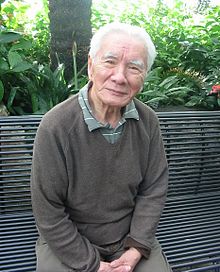Jerome Ch'en
| Jerome Ch'en | |||||||||
|---|---|---|---|---|---|---|---|---|---|
 Jerome Chen in 2003 | |||||||||
| Traditional Chinese | 陳志讓 | ||||||||
| Simplified Chinese | 陈志让 | ||||||||
| |||||||||
Jerome Ch'en FRSC (Chinese: 陳志讓; pinyin: Chén Zhìràng; October 2, 1919 – June 17, 2019) was a Chinese-Canadian historian.
Early life and education
[edit]Ch'en was born as Ch'en Chih-jang in Chengdu, Sichuan, Republic of China in October 1919. He was educated at Tianjin Nankai University, National Southwestern Associated University in Kunming during the Anti-Japanese War and at the London School of Economics (LSE), which he attended funded by a Boxer Indemnity Scholarship and where he studied under Friedrich Hayek.
Academic career
[edit]In the 1950s, Ch'en worked for the Chinese Service of the BBC. Before emigrating to Canada he was a Reader in history at the University of Leeds for a number of years. He was Professor of Chinese History at York University in Toronto, Canada from 1971 to 1987. He was the director of the University of Toronto/York University Joint Centre of Asia Pacific Studies (JCAPS) from 1983 to 1985.[1]
Honours
[edit]Ch'en was made a Fellow of the Royal Society of Canada in 1981. In 1984, he was named Distinguished Research Professor at York.[2]
Death
[edit]Ch'en died in St. Catharines, Ontario, Canada in June 2019 at the age of 99.[3]
Selected publications
[edit]- Yuan Shih-ka̕i, 1859-1916: Brutus Assumes the Purple (George Allen & Unwin, 1961).
- The Highlanders of Central China: a History 1895 – 1937
- Mao and the Chinese Revolution
- The Military-Gentry coalition—the Warlords Period in Modern Chinese History
- China and the West: Society and Culture 1815 – 1937 (Hutchinson, 1979)
Ch'en also edited:
- Great Lives Observed: Mao
Some of his works have been translated into Chinese or Japanese.
References
[edit]Further reading
[edit]- Lary, Diana. "Jerome Ch’en obituary: Historian of modern China, cut off from his roots, who rued the rise of the military and the Communist conquest" The Guardian 18 July 2019. online
External links
[edit]- 1919 births
- 2019 deaths
- 20th-century Canadian historians
- 21st-century Canadian historians
- Academics of the University of Leeds
- Alumni of the London School of Economics
- Boxer Indemnity Scholarship recipients
- Canadian male non-fiction writers
- Canadian sinologists
- Chinese emigrants to Canada
- Chinese expatriates in the United Kingdom
- Chinese sinologists
- BBC people
- Educators from Sichuan
- Fellows of the Royal Society of Canada
- Historians from Sichuan
- Chinese historians
- Nankai University alumni
- National Southwestern Associated University alumni
- Writers from Chengdu
- Academic staff of York University
